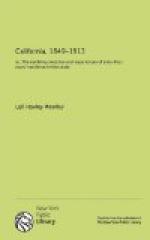“Thus it was that Adams & Co. were able to parade under the stars and stripes in that memorable parade of October 28, 1850, in celebration of the admission of California as a state into the union. After the parade Mr. Haskell presented the flag to their chief messenger, my father, Mr. Thomas Connell, and it has been in our possession since.”
Mr. Thomas Connell.
Mr. Connell was one of the few of the early comers who never went to the mines, though of course, that was his intention. He started, but somewhere on the Contra Costa side — it was all Contra Costa then — he fell ill of malaria fever. There was no one with time to bother with a sick man and he was unable to proceed or return so he expected to end his life there. When the disease abated he concluded that he had no desire to penetrate further into the wilderness, so he turned his face towards San Francisco again. He was a shipwright by trade and though there was nothing doing in his line, he saw the possibilities of a boating business when there were no wharves, piers or other accommodations for freight or passengers. One of the curious uses to which his boats were put was the carrying of a water supply. They were chartered by a company and fitted with copper tanks which were filled from springs near Sausalito. On this side of the bay the water was transferred to wagons like those now used for street sprinkling and the precious fluid was supplied to householders at a remunerative rate of twenty-five cents a pail, every family having one or two hogsheads fitted with a spigot to hold the supply.
Mr. Connell also carried the first presidential message received in the State, rowing up the Sacramento River day and night in his own boat to deliver the document at the capitol, and for sake of the sentiment he also carried the last one received by steamer as far as Oakland, whence the delivery was completed by train.
Uncle Phil Roach, Happy Valley.
Uncle Phil Roach, editor and founder of the “San Francisco Examiner,” lived on Clementina street near First. He was one of those good natured, genial old men that everybody liked, was at one time president of the Society of California Pioneers (1860-1), and later elected to the State Legislature. He afterwards acted as administrator of the Blythe estate, but died before its final settlement.
The place where he lived was called Happy Valley and the only entrance to it was at the intersection of Market, Bush and First streets, this crossing being at the east end of a sand dune about 30 feet high, extending westerly about half a mile. At this time the waters of the bay came up to the corner of Market and First streets, but it was not long before this, and many other sand dunes, disappeared, being scraped and carted off to fill the nearby mud flats.
There was at this time a little wharf 50 feet wide extending out into the cove from the foot of Clay street at Davis 1550 feet to a depth of 35 feet. It was called “Long Wharf.” To the north of this wharf the water lapped what is now Sansome street for a block (to Washington street) and followed the shore line to the corner of Jackson and Montgomery streets.




